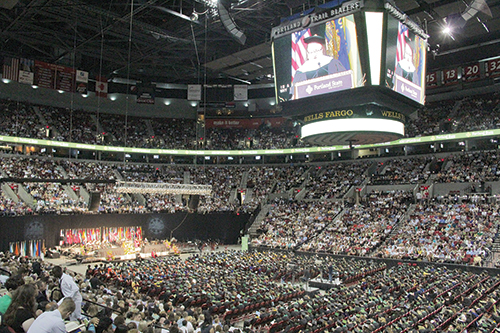Portland State has just received a $1 million merit award from the Oregon University System. Every five years, the State Board of Higher Education sets aside money from the state’s budget specifically aimed for growing its universities. The money is used to provide incentives for schools to work on developing and improving particular areas.
Ka-ching! PSU gets $1 mil for graduating students

Portland State has just received a $1 million merit award from the Oregon University System.
Every five years, the State Board of Higher Education sets aside money from the state’s budget specifically aimed for growing its universities. The money is used to provide incentives for schools to work on developing and improving particular areas.
The $6.4 million is from the Board of Higher Education’s budget over the 2011–13 biennium and will be divided between Oregon’s universities.
The money was awarded based on performance in two areas: the number of degrees an institution awards to Oregonians and the number of degrees awarded to underrepresented minority and rural Oregonians.
In the past, the board had directed universities to focus on increasing enrollment rates and improving retention rates. Now, the goal is to raise the rate of students receiving degrees. There is an extra incentive for graduating more minority and rural students.
In the 2011–12 degree year, PSU had 4,889 degree recipients, 818 of whom were underrepresented and/or rural students. Out of the seven major universities and colleges in the state, PSU graduated the most students in both categories and received the most funding because of it.
“We received the award based on the total number of degrees we awarded and the numbers in subgroups who are usually underrepresented,” PSU President Wim Wiewel said in an email. “We were able to get the largest award because we have purposefully grown into the largest university in Oregon in order to meet the educational needs of Oregon residents.
“In addition, we have made special efforts to reach out to underrepresented groups and made sure they could succeed,” he said.
The money has already been factored into the budget and has been allocated to departments and colleges with the university.
A contributing factor to the merit award is PSU’s enrollment, which is the highest in the state. Students like Mikaele Faatea, a senior working toward an electrical engineering degree, have been drawn in by the opportunities the university provides.
Having tried other colleges and universities in the state, Faatea has made his home at PSU. “I went to other colleges, but some are just far away and secluded from everything.
“I like the atmosphere here. It’s close to things, close to jobs and it’s one of the best locations to find jobs in my degree,” Faatea said. “There’s just opportunity here.”
The incentive plan is just one element of Oregon’s 40-20-20 plan, a national and state goal aimed at raising the number of higher-educated citizens. The goal is that 40 percent of the state’s citizens will have received a bachelor’s degree or higher, 40 percent will have an associates degree, and 20 percent will have graduated high school or received an equivalent degree.
“It’s about increasing degrees for Oregonians,” said Di Saunders, a spokesperson for OUS. “This provides campuses incentives for the number of degrees to Oregonians and underserved students.”
PSU has been successful in awarding degrees because of retention rates and student support.
“The campus is doing an excellent job,” Saunders said. “The campus has been ‘strengthening students and the number of graduates.’”
Because of these factors and programs like the Last Mile, which finds former students who were close to graduation and helps them complete their degrees, PSU has made progress toward the 40-20-20 goal.
Not only is the increase in graduates good for the university, it is also beneficial to the state, Saunders said.
“It’s a way to take budgets from certain areas and make advances as a state,” she said. “States with highly educated citizens have a better, stronger economy. Strength and stability go hand in hand.”
The incentive program has helped the state increase the number of citizens with a bachelor’s degree to nearly 29 percent.





